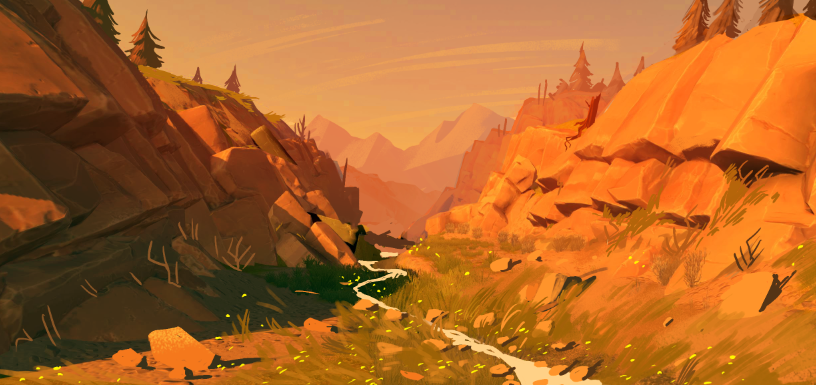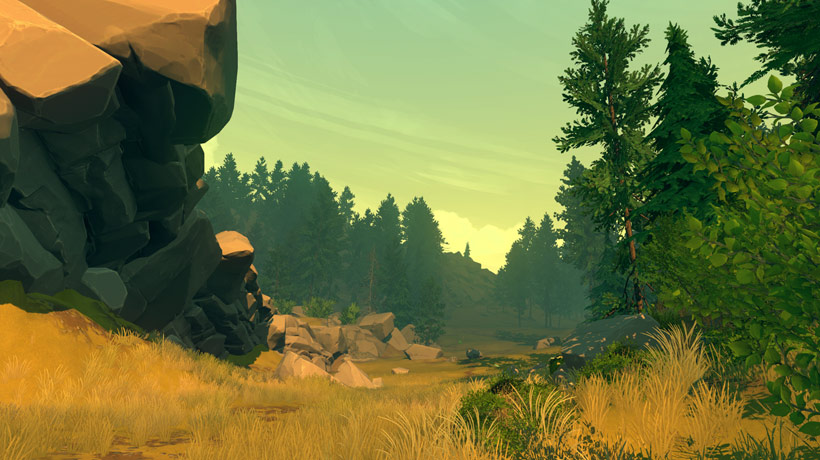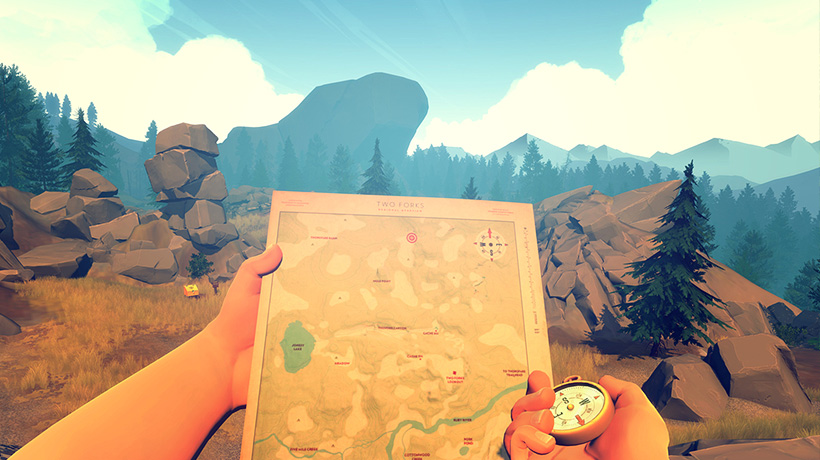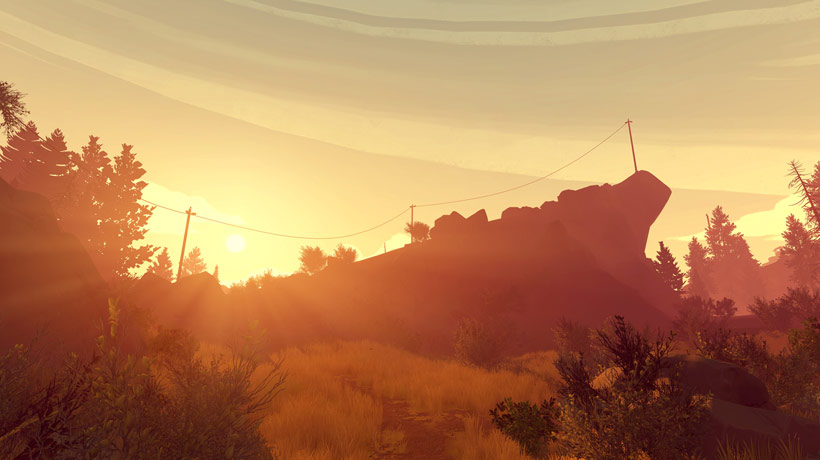Firewatch is Camp Santo’s debut endeavor into the realm of game releases and you wouldn’t know it for a second. Although another addition to the ever-popular walking simulator genre, following in the narrative-driven footsteps of Everybody’s Gone to the Rapture, Firewatch is a wholly different and truly unique experience. The year is 1989 and there’s something in the forest.
Everyone Has a Story
You’re Henry, a gruff chap who’s volunteered as a fire lookout for the Wyoming wilderness in a bid to escape his messy life for a summer. You’re introduced to Henry and his situation through a profoundly moving prologue, delivered through text choices that immediately play on your sense of morality. This sense of choice and power over such life decisions successfully nestles you into Henry’s boots, kick starting a relationship with him built on complex emotions like guilt and empathy. It’s a great method to validate not only his presence in the wilderness, but also his motivation for many of his subsequent dialogue options.
This dialogue is shared almost exclusively with Delilah, your lookout supervisor, via a handheld radio. A walkie-talkie, if you will. You access radio contact via the triggers, much like the actual devices’ buttons, giving a functional and immersive illusion. It’s just one of the many ways Firewatch gently tugs you into its reality, getting you more and more involved with what’s going on behind the screen. You can question much of your surroundings, calling it all in to Delilah, sparking numerous conversations about the most trivial of things, from panties to pine cones.
Through the Walkie Talkie
Both Delilah and Henry are brilliantly fleshed out in their own right. From Delilah’s initial drunken contact to your flirtatious exchange a few weeks on, their interactions are astoundingly human and never slip away from a natural flow of conversation. Heaps of humor and sarcasm will draw genuine chuckles while their fear and anxieties will be directly mirrored onto yourself, constantly building a relationship between you and the duo throughout your excursion. They’re the beating heart of Firewatch and where you’ll glean the most meaningful experiences, as long as you listen closely.
Your role is to do whatever Delilah tells you to do, ranging from stopping some skinny dipping teenage girls setting off fireworks to gathering supplies from a far off cache drop. Not specifically laid out as missions, your jobs come and go naturally. The first few will have you leave your lookout to transcend varying terrain, solve the issue and then return to your post. You’ll initially fret that this back and forth formula will endure, but Firewatch never does anything to a routine. Days in the forest usually end at clever intervals, often skipping several weeks later. It’s a simple method of avoiding repetition, but keeps continuity on the straight and true. The game knows that you’re aware it’s time to hike back to base, so it just decides to not make you endure it unnecessarily.
Luscious Landscapes
The story itself is fundamentally self-contained in the forest it occurs within, thankfully bearing no necessity for a sequel or DLC of any sorts. The writing is next to flawless with a story arc you don’t even remotely expect, and it’s all played out through radio conversations, supported by a blindingly attractive environment. Firewatch boasts a supremely colorful environment that’s simple, but so acutely effective. Although quite boldly colored, there’s a sincere sense of reality everywhere you look. Dust clouds blowing down a track, or a stag bounding down a hill are all amazing little additions that collect into an unforgettable rendition of such a wildly unique landscape. The devil is in the detail, though, with intricate posters, eye-catching lighting and spectacular horizons sealing the deal on the graphical prowess at play here.
It’s a real shame, then, that Firewatch’s almost singular nagging feeling comes from the visuals. Although unequivocally fantastic, the world around you is somewhat hindered by an incessantly choppy frame rate. Especially expansive views or busy fields cause the game to struggle, the frames plummeting. It’s the only hiccup of note and, although not constant, it certainly compromises the most distinguishing feature in Firewatch’s repertoire. In this age of post-launch patches it’s more than likely such a minor technological flaw will be patched out, but it cannot be ignored through such hopes alone.
Alone in the Woods
Isolation is a huge tool in Firewatch and the coupling of this amazing environment and only a handful musical instances work admirably to achieve it. You’ll spend a huge amount of time simply wandering in almost total silence, occasionally checking your map and compass to gain your bearing, drinking in the expertly crafted scenery and the crunch of the forest floor underfoot. There are times when you’ll be completely on edge, the isolation an eerie creeping feeling on the back of your neck, while there are times that it’s actually a welcome reprieve. This, yet again, displays Firewatch’s uncanny ability to envelope you in Henry’s emotions as he battles with his decision to leave his world behind and the many current situations at hand.
Navigating the Wyoming wilderness has its difficulties, but rightly so. Armed with a map of the area and a compass, you’ll come to rely on both regularly to get around and come to regard waypoints as a thing of the past. The omission of things like a HUD and waypoints work great in Firewatch and are an important design choice. Navigating can be difficult initially and you’ll certainly get lost a fair few times, but it only goes to show how firmly in reality the gameplay is. The surroundings carry many distinguishing features and, much like anyone residing in an area for a long time, you’ll come to be fairly familiar with your neck of the woods before long. This’ll naturally reduce your reliance on the map and compass and encourage more adventurous exploring, taking you off the beaten track of the story. Some sections are discreetly inaccessible without certain tools like rope or a pulaski, allowing you to progress to these areas along the natural pace of the story rather than exploring everywhere right off the bat.
Make Yourself At Home
The map area is satisfyingly large and visually diverse but there’s not a huge array of things to do outside of the story. There are cache’s littered about offering previous campers notes, map updates and the odd trinket which usually yield a nice patch of dialogue and work to weave a great set of subplots, but that’s about it. The main feature that’ll have you coming back to Firewatch is its dialogue variety. Most circumstances will offer a few options and cause the story to play out in entirely different vibes, even if the end result is largely the same. We played through the four to five hour storyline several times, making the most of each option and getting distinctly different but equally enjoyable experiences each time.
Through the combination of a simplistic but phenomenally effective art style and some incredibly fluid dialogue sequences, Firewatch proves itself time and time again as one of the most memorable games we are likely to play in a long while. It’s poignant and very special, albeit disappointingly choppy at times. It may feel a touch short, but its story will feel firmly finished upon reflection, remaining naturally entombed in the Wyoming woods. This is a rare game that tackles strong morals and emotions under the guise of a beautiful walk through the wilderness that always manages to keep you on your toes, a walk you’ll be hard pressed to ever forget.
Firewatch review copy provided by publisher. For information on scoring, please read our Review Policy here.
-
Stunning graphics
-
Fluid and human dialogue
-
Unique and clever storyline
-
Intuitive and immersive gameplay
-
Suffers with drops in framerate on occasion
-
Feels a touch too short
Firewatch Gallery
-
2640740 Firewatch 4
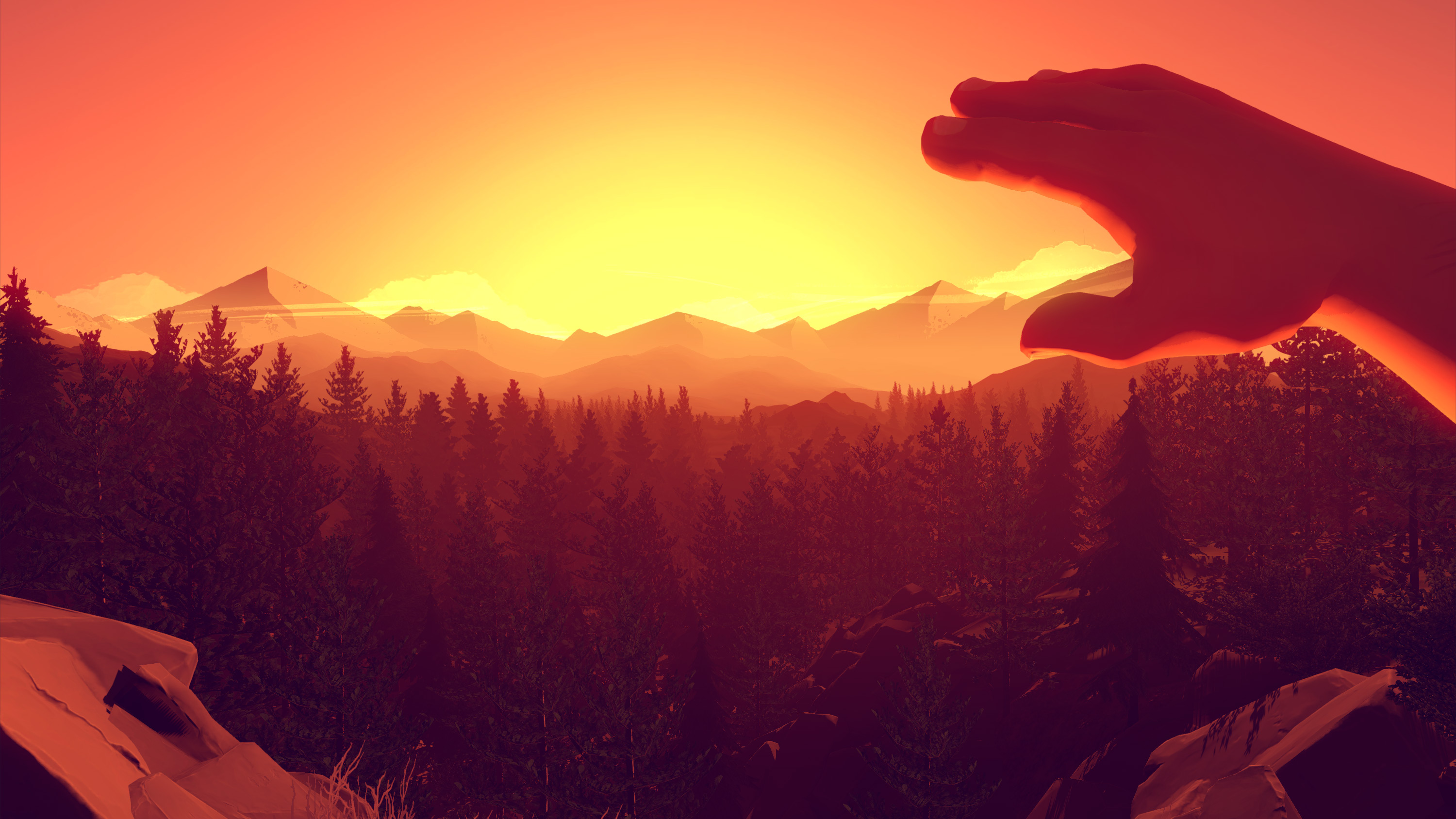
-
2676854 Firewatch 5

-
Firewatch 1 0

-
Firewatch_150305_05
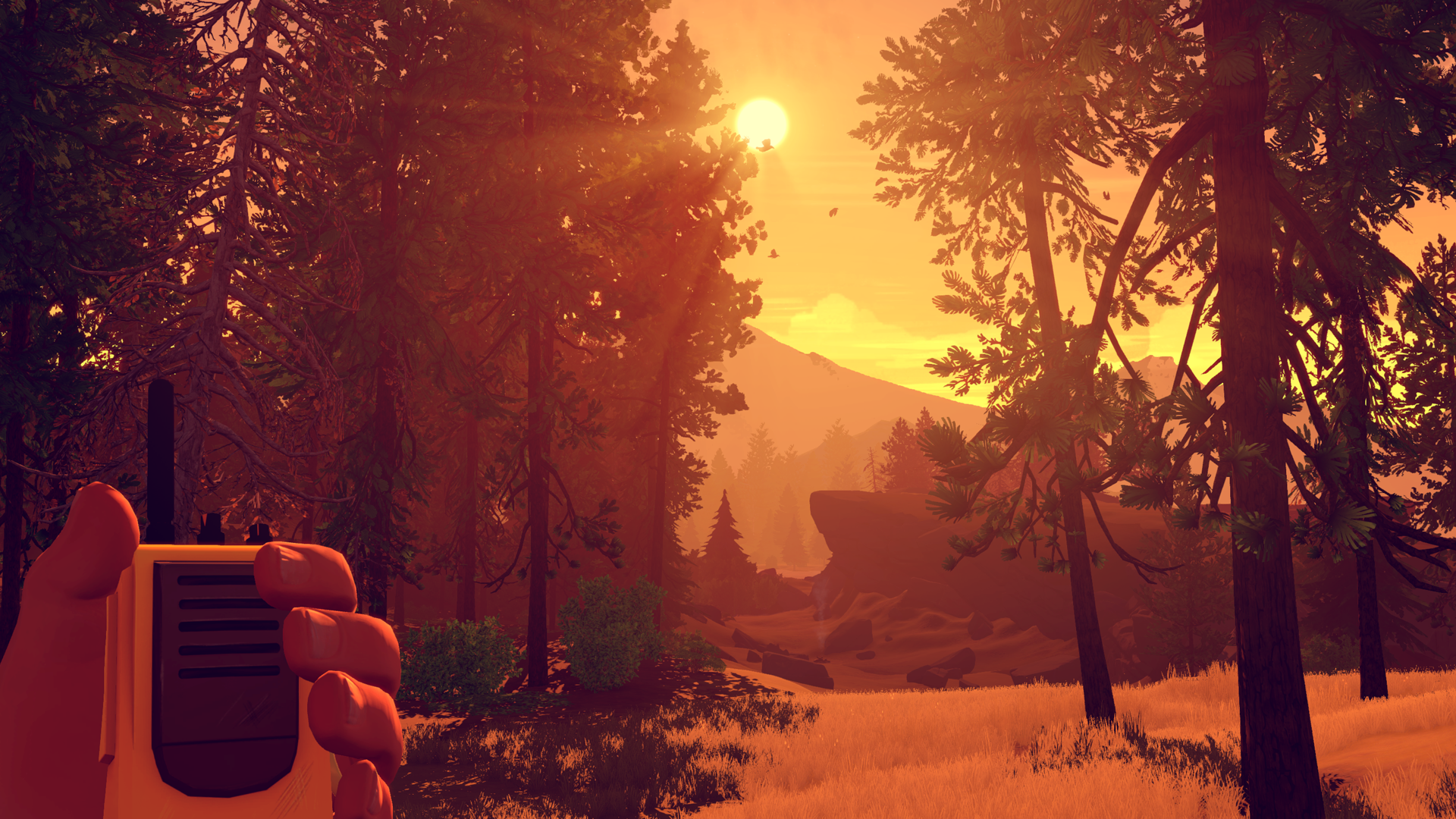
-
Firewatch_5
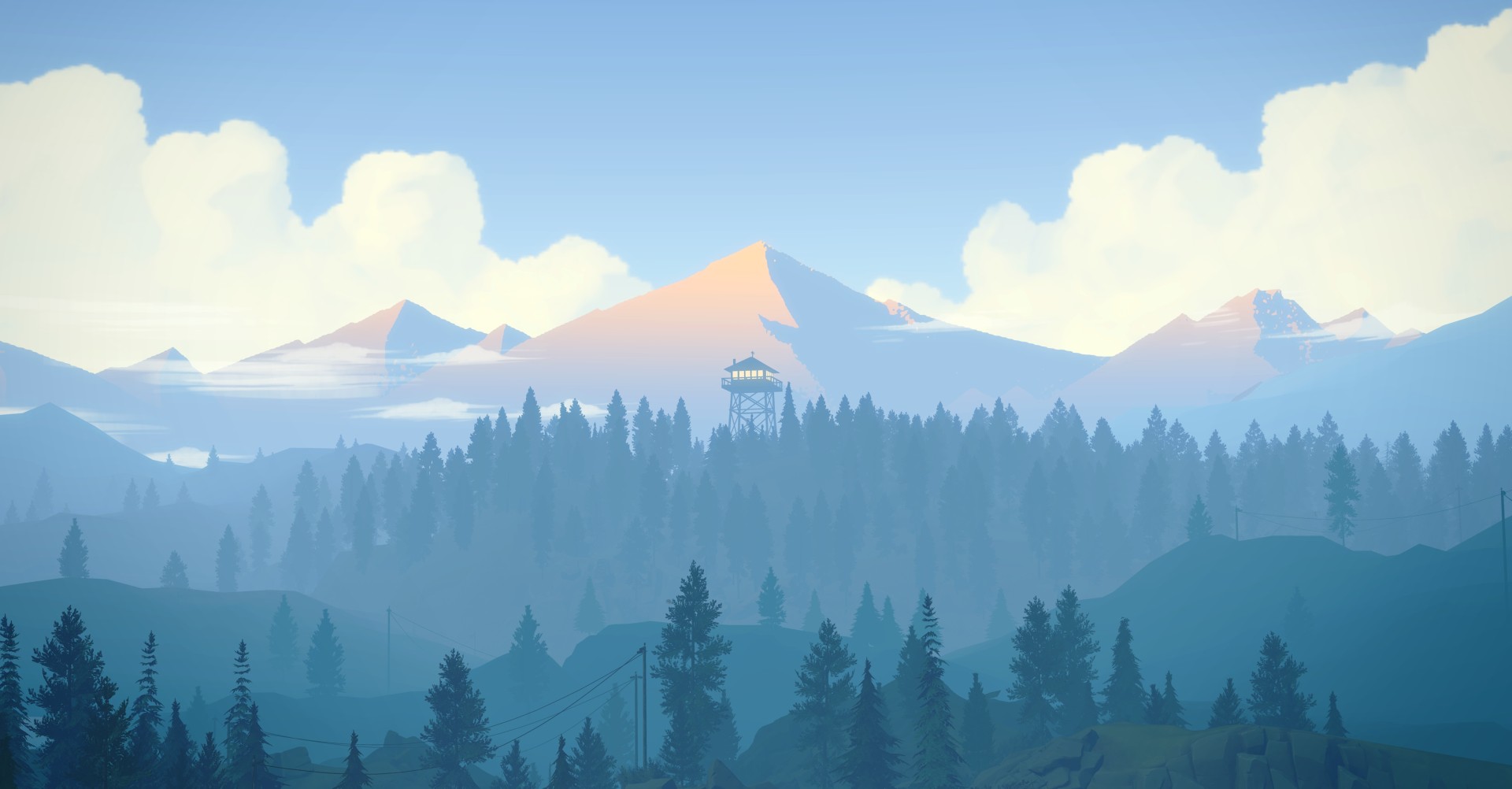
-
Tumblr_ndikg91kke1sikueao1_1280
